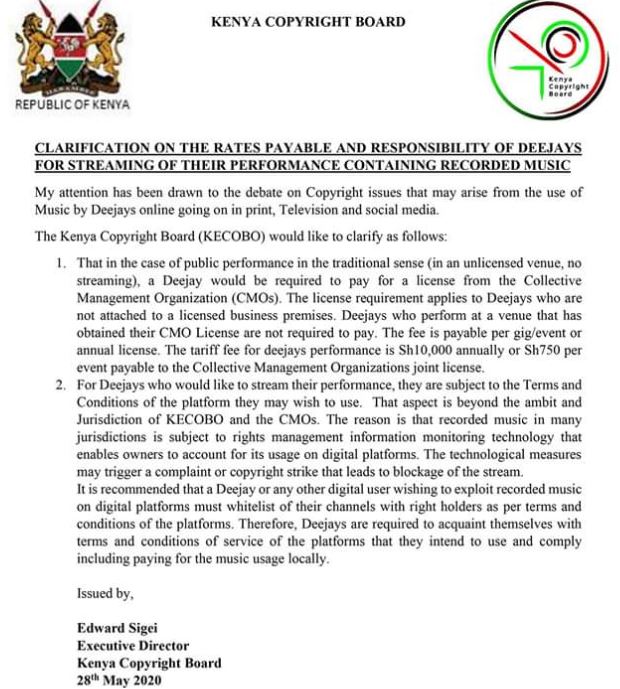 The Kenya Copyright Board (KECOBO) has issued a statement clarifying an earlier directive requiring disc-jockeys to have a special broadcast licence to live stream their performances.
The Kenya Copyright Board (KECOBO) has issued a statement clarifying an earlier directive requiring disc-jockeys to have a special broadcast licence to live stream their performances.
“When a DJ creates a live stream and starts broadcasting music to the Internet, he has become a radio station. He needs licences from copyright owners or Collective Management Organisations (CMOs),” Kecobo had said on Wednesday.
“Anyone who violates the exclusive rights of the copyright owner is an infringer of that copyright,” the board added.
Paul Kaindo, an advocate at KECOBO, said DJs need to apply for two licences – a special broadcast license and a public performance license – in order to conduct their live streams.
The operations manager at MCSK, Paul Enyenze, added that the license would be issued at a yearly flat rate of around Ksh200,000 if the DJs are not making any money from the content.
However, if the DJs are gaining financial reward from using the recorded content, CMOS would take a percentage from whatever they are making.
This sparked protests from the DJs and a public outcry from music lovers who have been heavily-dependent on live streams for entertainment during the coronavirus lockdown at home.
KECOBO on Thursday responded to the complaints, clarifying that DJs attached to licensed business premises are not be required to pay.
“The license requirement applies to Deejays who are not attached to a licensed business premises. Deejays who perform at a venue that has obtained a Collective Management Organization (CMO) license are not required to pay,” said KECOBO Director Edward Sigei.
The copyright board added that freelance DJs who are not attached to a licensed business premises or have not paid are required to pay Sh10,000 annually or Sh750 per event, payable to CMOs.
This applies to public performances in the traditional sense(no streaming).
As for live streaming, KECOBO warned that performances containing recorded music are subject to terms and conditions of the platforms DJs use. It noted that online performances are beyond its jurisdiction and the ambit of licensing CMOs.
“It is recommended that a deejay or any other digital user wishing to exploit recorded music on digital platforms must whitelist their channels with rights holders as per terms and conditions of the platforms… Deejays are required to acquaint themselves with terms and conditions of service of the platforms that they intend to use and comply including paying for the music usage locally,” said Sigei.







